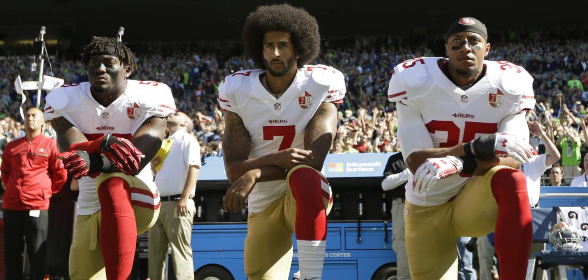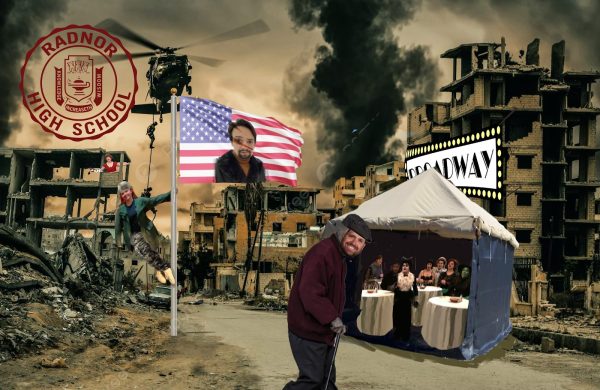Dissent vs. Unity: On Dissent as a Tool of Democracy

October 16, 2017
Recent protests of the national anthem have shaken the world of sports. Colin Kaepernick started the movement last year when he controversially kneeled as the anthem played before a National Football League game, in an attempt to draw attention to police brutality in the United States. This season, many others have caught on, drawing both passionate criticism and support of the protests. The phenomenon has accentuated the clear divide that exists in our country’s dialogue. Today, two distinct perspectives dominate the national conversation. On one end, the protests are considered a rightful, free speech-endorsed response to injustices in America. On the other, they are criticized as an act of abhorrent disrespect to the country and the military. Two students examine the balance of these two general positions in relation to dissent and unity in our nation’s identity.
Today’s political discourse remains engulfed in the flames of anger, disenfranchisement, and misunderstanding. But even beyond politics, Americans exist in factions more so than ever before. In urban hot spots of progressivism, many call out conservatives of middle America and elsewhere for alleged racism and xenophobia. Similarly, those on the right criticize liberals of the coasts for failing to uphold traditional values and discarding the principles they view the U.S. as having been built on. As described by David Brooks of The New York Times, “We’re living in the middle of a national crisis of solidarity.” To eventually mend these clearly worsening wounds, where can we turn? Some call for the pursuit of national harmony under common ideals. Others uphold the right to disagree as even more fundamental than our togetherness. Perhaps acknowledgement of both ends of the spectrum will lead us forward. Belief in unity must be at the core of the American attitude, but with it must also come the acceptance of dissent as an impetus for improvement.
From its inception, the United States has found itself guided by a key set of principles. Among them are the values we continue to enshrine as quintessentially “American”, including support of justice, belief in liberty, pride in country, and an emphasis on individualism. In painting a picture of the essence of individualism in America in his poem “I Hear America Singing,” Walt Whitman described citizens as “singing what belongs to him or her and to none else. . . Singing with open mouths their strong melodious songs.” His insight reflects on the impact of this central element of our republic. Unlike in other spheres of the globe, America and its citizens promote the individual as a driver of achievement. Freedom to pursue the American dream continues to attract the tired, the poor, and the oppressed to a haven where past does not dictate future standing. While there remain obstacles in this pursuit, those who come from nothing nonetheless have a chance at improving their situation for themselves and for their children. “Singing”, in this sense, perfectly sums up the individualistic aspect of the American way that is conducive to shared belief in our country.
We as a nation, even in times of total divide, uphold our common principles. Take the peaceful transition of power in Washington for example, where American presidents throughout history have consistently, without hesitation, handed the baton to the next in line, even amidst politically driven tension. The U.S. has never had to confront this potential abuse of democracy, whereas many of the world leaders of today fight to stay in power when law indicates they should not. Democracy ensures a stable status of affairs. Across the spectrum, Americans of varying beliefs and attitudes can still champion their system as a model of growth and stability. We find common ground in recognizing what our country represents and what it can become.
Our common ground only extends so far, however. Undeniably, we face some challenges that can not be remedied solely by togetherness. Instead, willingness to accept dissent and to engage in debate must also hold significance in our American identity. The American Constitution in particular lays the groundwork for this dissent to happen, in promoting an ideal we hold in high regard: free speech. The first amendment directly puts forth speech as an essential aspect of American liberty. With this fundamental liberty, opinions on all sides of an issue become free to emerge and exist without intervention. Diversity of opinion and perhaps more importantly the ability to express diverse opinions serves as a means to preserve truth.
One often forgotten but key historical example of speech as a means to truth came fifty-five years ago, when the U.S. government pushed its anti-communist film, “Operation Abolition.” Many viewed the film as a form of propaganda that invoked fear as a means to discourage dissent. Protesters hoped to fight back under the first amendment, and soon did. The American Civil Liberties Union of Northern California used their freedom of expression as a democratic tool to retaliate, releasing their own film in response, critical of government policy and censorship under the veil of unity. It succeeded, drawing widespread opposition to the government’s labeling of all who disagreed as communist sympathizers. The ACLU reflected upon this victory perfectly, suggesting we can remember it “as a lesson in the power of free speech and free thought. . . If we remain vigilant, lies can wither in the face of the truth.”
As this case demonstrates, national unity is not always the solution in resolving matters of contention. Although meaningful in preserving the nation’s backbone, it can fail in matters where truth is not the basis for our togetherness. We must encourage debate when we disagree. We must welcome differences in opinions as drivers of societal betterment. Dissent becomes necessary when unity fails in keeping our nation guided under its core values.






